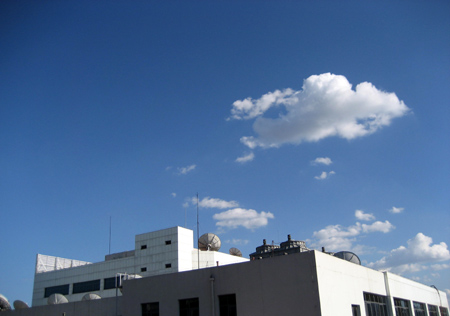More than 400,000 Beijingers have joined an online discussion about whether to keep a pre-Games car ban.
Nearly half of them supported a permanent car restriction -- an alternating odd-even license plate system from July 20. While the others, mostly car owners, opposed.
Clear air, clean water and safe food, among all other good things, left local residents with not only an "exceptional" Olympics but a keen concern about the Games' "green legacy" which featured blue skies.
|

|
|
Clouds float in the clear blue sky in Beijing, August 31, 2008. Clear air, clean water and safe food, among all other good things, left local residents with not only an "exceptional" Olympics but a keen concern about the Games' "green legacy" which featured blue skies.
|
"I support a long-term car restriction. We have made some mistakes in the past. Now we should correct them and return blue skies to our children," wrote a netizen named He Luzhu in the forum on www.ynet.com, the portal site of Beijing Youth Daily.
Air pollution and jammed traffic emerged key problems in 2001 for Beijing's bid to play host the 2008 Summer Olympics, said Sun Daguang, vice secretary of Beijing 2008 Olympic Games Bid Committee.
The host city's seven-year efforts to minimize pollution were highlighted by the relocation of a gigantic steel company, and the car ban that rested nearly 2 million, or one third of the city's vehicles, as taxis, buses and other public-service vehicles were exempt.
"The sky was high and blue during the Olympics. It's so much better than those foggy days," said a repair worker surnamed He, who took 4 to 5 hours every day riding a bicycle to visit his clients.
People who opposed a long-term car ban argued it was a pain easer rather than a permanent cure.
"Only after the government makes great progress on improving public transportation should we discuss whether to keep the car ban. I love blue skies very much. But I had to drive a car because I could not stand packing in a bus for six hours a day," said an anonymous netizen.
Official statistics showed the city's roads were extending at an annual rate of 3 percent while the number of vehicles was increasing at about 15 percent per year.
"When cars run at low speeds in traffic jams, they emit way more pollutants and usually consume more oil," said Hao Jiming, a member of Chinese Academy of Engineering.
Many people who had expressed annoyance over giving up their cars for blue skies are intensely scared of returning to days of choking smog and rush-hour congestion when the restrictions end after the Paralympics.
The Beijing traffic authorities have admitted receiving many submissions from car owners, saying they were comfortable with the odd-even number system and hoping it would last.
The city would continue to improve its public transport service by expanding transport networks while keeping fares low after the Olympics, said Zhou Zhengyu, deputy director of the Beijing Municipal Committee of Communications.
"We aim to create a more convenient and comfortable environment for people traveling in the city," he said.
The car ban might be a cure for congestions but not necessarily the best one, said Yang Kaizhong, an economist from Peking University.
He argued there were a variety of methods such as charging for causing congestion and raising parking fees which proved effective in some foreign countries.
For local government, challenges remained mainly in two aspects.
One was how to effectively restrict vehicles owned by governments and state companies, and develop shuttle bus schemes as alternatives. Some people had suggested to mark those "official" vehicles with distinctive signs to differentiate them from private cars.
The other was to maintain the prolonged subway service hours and increased trains and buses, and meanwhile continue building more roads.
For citizens, the biggest challenge could be the transformation of ideas. Driving a car would probably save one some time but it would cause many other problems that would do harm to the mass. People would eventually understand their individual interests were not in conflict with public ones.
Last but not least, the car owners would have to overcome the impulse to drive, which, some say, would be a test for them who were usually labeled China's "middle class".
(Xinhua News Agency September 1, 2008)